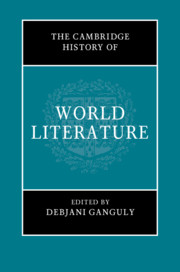Book contents
- The Cambridge History of World Literature
- The Cambridge History of World Literature
- Copyright page
- Contents
- Figures
- Contributors
- Acknowledgements
- Introduction
- Part I Genealogies
- Part II Thinking the World
- Part III Transregional Worlding
- Part IV Cartographic Shifts
- Part V World Literature and Translation
- Part VI Poetics, Genre, Intermediality
- Part VII Scales, Polysystems, Canons
- Part VIII Modes of Reading and Circulation
- 40 Transregional Critique and the Challenge of Comparison: Between Latin America and China
- 41 Reading World Literature through the Postcolonial and Diasporic Lens
- 42 The Indian Republic, Reading Publics, and World Literary Catalogues
- 43 The Cultural Industry and Digital World Making
- Part IX The Worldly and the Planetary
- Index
- References
40 - Transregional Critique and the Challenge of Comparison: Between Latin America and China
from Part VIII - Modes of Reading and Circulation
Published online by Cambridge University Press: 17 August 2021
- The Cambridge History of World Literature
- The Cambridge History of World Literature
- Copyright page
- Contents
- Figures
- Contributors
- Acknowledgements
- Introduction
- Part I Genealogies
- Part II Thinking the World
- Part III Transregional Worlding
- Part IV Cartographic Shifts
- Part V World Literature and Translation
- Part VI Poetics, Genre, Intermediality
- Part VII Scales, Polysystems, Canons
- Part VIII Modes of Reading and Circulation
- 40 Transregional Critique and the Challenge of Comparison: Between Latin America and China
- 41 Reading World Literature through the Postcolonial and Diasporic Lens
- 42 The Indian Republic, Reading Publics, and World Literary Catalogues
- 43 The Cultural Industry and Digital World Making
- Part IX The Worldly and the Planetary
- Index
- References
Summary
In spite of their long history of contact, exchange, and dialogue, Chinese and Latin American cultures constitute a challenge for comparative, transregional, and world-literary thought. By drawing on examples of literary and cultural contact between these two cultures that emerge through a closer look at the 1965 novel Farabeuf by Mexican writer Salvador Elizondo, this chapter will diagnose some of the challenges of comparative, relational, and world-literary methods. It models a transregional critique as a multi-scalar, poly-comparative approach to thinking about shared literary and cultural worlds: as histories marked by Orientalist fantasies, networks of literary circulation, translation, and influence, as well as by the challenges of literary worlding in the face of global power dynamics.
Keywords
- Type
- Chapter
- Information
- The Cambridge History of World Literature , pp. 789 - 803Publisher: Cambridge University PressPrint publication year: 2021



